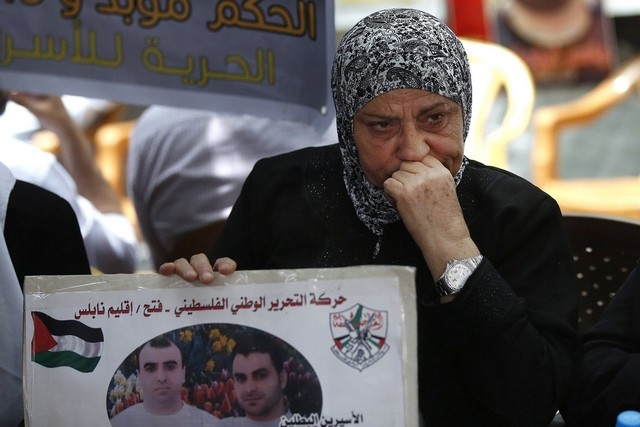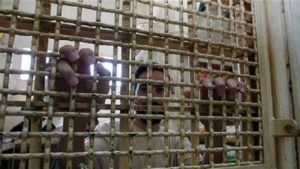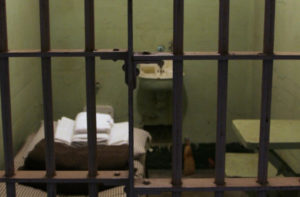
A Palestinian mother whose son is being held in an Israeli prison cries as she takes part in a protest in solidarity with Palestinian prisoners on hunger strike in West Bank city of Nablus on May 14, 2017 – EPA photo.
Ramallah, 21 Sha’ban 1438/18 May 2017 (MINA) – On April 17, around 1,000 Palestinian prisoners in Israeli jails launched a mass hunger-strike to protest the difficult humanitarian conditions in Israeli jails and demand better treatment. Since then, prisoners started feeding solely on water and salt as their only sources of nourishment.
Spearheaded by Marwan Barghouti, member of the Palestinian Legislative Council and Fatah Central Committee, as well as Karim Younis and Maher Younis, the oldest and longest serving detainees held since 1983, and Diaa al-Agha, held since before the signing of the 1993 Oslo accords, the strike, widely known among Palestinians and supporters as the “Freedom and Dignity” battle, was joined by prisoners from all Palestinian political factions. Over the days, more prisoners have joined the strike.
Also Read: Nine Israeli Soldiers Injured in Gaza Fighting, Total Casualties Continue to Mount
The prisoners’ main demands include being moved to prisons in the occupied territories as per the Fourth Geneva Convention, which would make it easier for their families to visit them, and lifting restrictions on family visits and better treatment of families at military checkpoints.
The prisoners also demand an improvement in access to medical care; increasing visit duration from 45 to 90 minutes; families of women prisoners meet without glass barriers to allow mothers to hold their children; an improvement in detention conditions including easing restrictions on the entry of books, clothing, food and other gifts from family members; restoring some educational facilities; and installing public phones to enable prisoners to communicate with their families.
But Israel would not submit to any of the prisoners’ demands and would go for intensified measures to crush the strike. For example, Israeli prison authorities started moving leaders of the strike to new locations, confiscated belongings of the striking prisoners including their clothes, leaving them with only the clothes they have on, transforming the prisoners’ rooms into isolation cells, establishing a field hospital in Naqab desert to deal with the strikers since they were not allowed to be taken to regular Israeli hospitals, and blocking local and Arab television channels.
It was later announced that the Israel Prisons Service (IPS) was going to start negotiations with prisoners’ leaderships over their demands. The national committee for supporting prisoners pointed that so far there hasn’t been any official negotiations, amidst prisoners’ insisting that negotiations should be conducted with only the strike leaders.
Also Read: Thousands Protest in Tel Aviv Demanding Prisoner Swap Deal and End to Gaza War
Israel even went as far as releasing a video of Marwan Barghouti reportedly eating despite being on hunger strike. The video was dismissed as unreal and described as fake by many people and an attempt by Israel to undermine the strike. Marwan’s wife, Fadwa, described the video as “vile and fabricated.”
International support has been pouring
Despite Israel’s insistence on ignoring the prisoners’ demands, Palestinian, Arab and international support has been pouring in since the beginning of the hunger strike.
Also Read: Israel to Build Nearly 2,400 New Settlement Units in Occupied West Bank
Palestinians throughout the occupied West Bank have been supporting and showing solidarity with the striking prisoners since the beginning of the strike. They set up solidarity tents, participated in protests and marches and declared general strikes.
Hundreds of Palestine supporters all over the world, including journalists, activists, students, celebrities, and officials among others showed solidarity with the prisoners after Aarab Barghouti, son of Marwan Barghouti, filmed himself drinking salt water in support of his father and other Palestinian political prisoners, launching a massive popular trend known as “Salt Water” challenge, which went viral on social media sites. The purpose of the trend was to bring attention to the striking prisoners and the salt and water that is keeping them alive.
Many Palestinian, Arab and international celebrities and public figures like singers Mohammad Assaf, Yacoub Shahin, Melhem Zein and pro-Palestine English comedian Mark Thomas and theatre director Jo Douglas, showed solidarity with the prisoners by taking the challenge.
Arab writers at The First Palestine Forum for the Arab Novel appealed to the world governments to intervene to end the suffering of the hunger striking Palestinian prisoners in Israeli jails.
Also Read: Israel Launches Massive Airstrikes on Gaza’s Beit Hanoun Amid Aggression War
Today, more than 1,800 prisoners have joined the open-ended hunger strike despite the fact that their health condition is getting worse day by day.
According to groups monitoring the conditions of the prisoners, health of the striking prisoners was reported to be deteriorating with many suffering from stomach pain, dryness in the throat and some spitting blood.
Recently, more prisoners have been moved to hospitals due to the noticeable deterioration in their health, while several prisoners’ societies warned against Israel’s plans to seek doctors to force-feed the prisons.
As the strike continues and as Israel remains stubborn regarding the prisoners’ demands, popular reaction is getting more and more agitated and is taking a more violent course. At least one Palestinian has been shot dead by Israeli troops so far in the West Bank during protests in support of the strikers. More, among the protesters and the prisoners, might also die in the coming days and the situation could then become out of control. (T/RS5/RS1)
Also Read: 100 Palestinians, Including 27 Aid Seekers, Killed in Israeli Airstrikes Across Gaza
Mi’raj Islamic News Agency (MINA)


































 Mina Indonesia
Mina Indonesia Mina Arabic
Mina Arabic